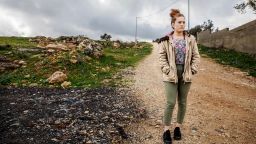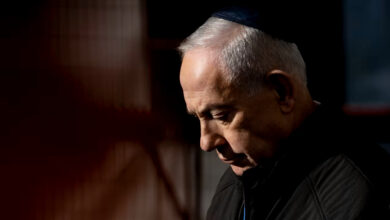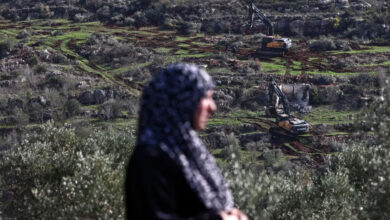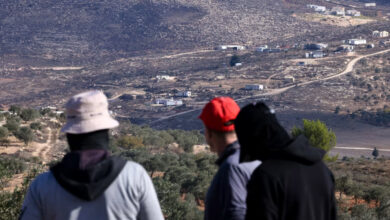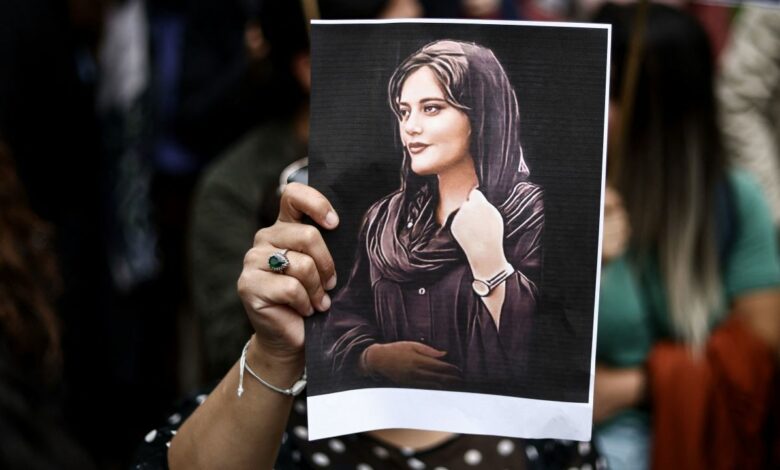
Young men seen in the video seem indifferent to the gunshots ringing out around them.
“I just hope one of them gets shot so we never see any of the slime balls again in the neighborhood,” Sabaaneh says, referring to the Israeli forces.
But soon after an ambulance drives by, the stream is cut short. This was the moment Sabaaneh was shot, says Ahmad Abu Tabikh, a cousin who was with him.
Speaking in their family home, Sabaaneh’s mother, Saeda Abu Tabikh, grew emotional as she explained that her son was just documenting the clashes.
“I say it to all mothers around me, it is not safe here at all. If your son is out when clashes are going on you should consider your son dead,” she said.
Sabaaneh became one of the more than 97 Palestinians killed by Israeli forces so far this year in the West Bank – making it the deadliest year in the West Bank for Palestinians killed by Israeli soldiers since 2015. Israel claims most killed were clashing violently with soldiers.
The Israel Defense Forces (IDF) said in a statement it came under attack by “rioters” the night Sabaaneh died and is examining the circumstances around his death. Although his cousin displays a photo of Sabaaneh with a gun, a common pose for young men from Jenin, nothing in his video suggests he was armed when he was killed.
The West Bank, which has been under Israeli military occupation since 1967, is simmering. Between the near-nightly Israeli raids, the clashes, the ensuing deaths, arrests and a political vacuum under an increasingly unpopular Palestinian Authority, there are fears it could soon boil over into a third Intifada, or uprising.
For months, Israel has been regularly raiding cities in the West Bank, saying it is targeting militants and their weapon caches before they have the chance to cross into Israel and carry out attacks. The operation, dubbed ‘Breaking the Wave’ by the IDF, was launched after a series of attacks earlier in the year killed 17 within Israel, three of whom were police or soldiers. One Israeli security guard and two Israeli soldiers have been killed in attacks in or near the West Bank since the beginning of the year, bringing the total to 20.
Israeli officials say they have stepped up the military operations because the Palestinian Security Services aren’t doing enough, and say they’ve prevented more than 300 attacks as a result.
“We demand that the Palestinian Authority not only speak out against terrorism, but also act against it. The spread of weapons and lack of governance are harming both the Palestinian people and the Palestinian Authority itself,” Israel’s Defense Minister Benny Gantz said earlier this month in a statement. “We will not allow armed men who seek to murder Israelis, to roam around freely. We will pursue and stop them.”
The Palestinian Authority didn’t respond to CNN’s request for comment. Last week, Palestinian Authority Prime Minister Mohammad Shtayyeh said Israeli military operations in the West Bank are “nothing but a recipe for a major explosion fueled by Israel with its various political parties for their election propaganda.” He accused Israel of trying to “destroy the Palestinian Authority and undermine its institutions.”
Israel and the Palestinian Authority cooperate on security matters under the terms of the Oslo Accords, from which the Palestinian Authority was formed in 1994. Palestinians who oppose this cooperation say that the Palestinian Authority is enforcing the Israeli occupation of the West Bank by cracking down on Palestinians.
The Palestinian Authority and its leader Mahmoud Abbas have also grown increasingly unpopular in recent years according to regular polling – partly for continuing the security cooperation with Israel, but also for what’s been dubbed as authoritarian behavior, like cancelling elections, forcing voters to wait for more than a decade; and arresting political dissidents, including a prominent activist who died in PA custody last year.
Those feelings seemed to come to the forefront earlier this week in Nablus, when residents violently clashed with Palestinian security services, throwing rocks and firing guns at the forces who had entered the city to arrest two suspects in scenes that shocked many Palestinians. One man, Firas Yaish, 53, was killed in the chaos. The PA is yet to announce the reason for the arrests.
“It’s very upsetting and dangerous,” said Dr. Mustafa Barghouti, president of the Palestinian National Initiative, an opposition party. “The last thing we want is to have internal fights between us while we are oppressed and discriminated against by the Israeli occupation… This could lead to very serious chaos.”
Palestinian and Israeli analysts say the battle for succession after the 87-year-old Abbas dies is already underway – on the streets in places like Jenin and Nablus.
“The most important factor is to call for elections, give people the right to choose their leaders, give the younger generation the opportunity to be represented in the system and to have their opinion heard,” Barghouti said. “At this time, [the youth] come to only one conclusion, they will hear you only if you use guns. And that is, of course, a dangerous situation for which not only the Palestinian Authority is responsible, but mainly it is Israel that is responsible for creating this situation.”
In Jenin, a feeling of hopelessness lingers along the narrow streets of its refugee camp, lined with posters celebrating Palestinians killed or those in prison. Shops sell necklaces with pictures of them – almost always shown with a gun.
It’s also where Al Jazeera reporter Shireen Abu Akleh was killed while covering one of the regular Israeli military raids – her death becoming a global story and diplomatic incident for Israel. A CNN investigation in May found evidence that suggested Abu Akleh was killed by Israeli forces, and earlier this month, the IDF admitted a “high possibility” that she had been shot and killed by Israeli fire – but no charges were announced.
Her producer, Ali Samoudi, who was with her the day she was killed, and who was also shot, says the blame ultimately lies with Israel, which he says wants a weak Palestinian Authority.
“The only one that bears responsibility for the situation is the [Israeli] occupation, and not the Palestinian Authority,” he said. “The occupation is killing every feeling of hope with its crimes against our Palestinian people.”
Children who come by to see Abu Akleh’s memorial at the spot where she was killed speak of becoming martyrs.
“Why would I live?” one 11-year-old asks. “It’s better to fight back… no one can protect us. We have to protect ourselves.”
Iran protests
Seventeen people have died in Iran during protests over the death of 22-year-old Mahsa Amini, who died in police custody last week, according to semi-official Tasnim News Agency. CNN cannot independently verify the death toll.
Thousands have been protesting across the country, with videos on social media showing demonstrators chanting, “women, life, freedom,” and some showing women removing their headscarves.
Here is the latest on this developing story:
- Iran’s army warned protesters, saying it’s ready to “confront enemies” to defend the nation.
- Rights group Amnesty International said eyewitness accounts and video analysis show a pattern of Iranian security forces “unlawfully and repeatedly” firing metal pellets directly at protesters.
- An all-female unit of the Disciplinary Force of the Islamic Republic of Iran was deployed for the first time in its history.
- Two members of Iran’s Basij paramilitary organization were killed during the unrest. It is unclear if these deaths are included in the overall total.
- Amini’s father accused authorities of lying about her death.
- Watch: Mahsa Amini’s family demands truth about her death in police custody
- The US imposed sanctions on Iran’s mortality police on Thursday.

